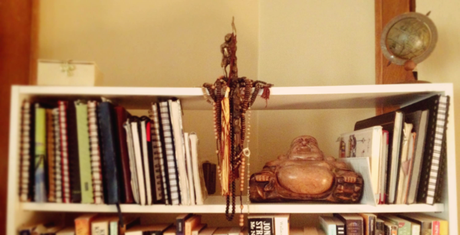Several times over this summer I’ve had occasion to consult journals from years past: in June, to prep meals and decide what to pack for a week-long canoe trip to Quetico with a friend; and twice this past week, to recall dates and details of adventures in my 20s and 30s.
I wasn’t always a journal-keeper, though. It wasn’t until I was in college that it occurred to me to write down what I was experiencing and doing, the people I was meeting, and the places I was traveling to and visiting. Since that time, my journals have served me well, both in the moment as a place to jot down thoughts and process feelings, and, later on, as a record of the who-what-when-why.
 Years' worth of journals.
Years' worth of journals.
Beyond recording the ins and outs of daily life, keeping a journal can be a useful tool as you begin the process of buying a home. Consider integrating the following tips to help you make the best decision possible for you and your family.
Make a list of features you’d like to have in your future home.
Many clients we work with have a long list of must-haves, as well as a good sense of what their dream home looks like. When all is said and done, however, many will choose a home that doesn’t have all the amenities they’d like, sometimes looking nothing like the home they thought they were looking for.
As you get started, make a list of what you’re looking for, while understanding that you may sacrifice certain items on it when you find your perfect home. As you begin to pare down the list, you may find it helpful to keep a checklist of your must-haves to compare against MLS listings.
Keep track of the details and characteristics of each home you see.
Your journal doesn’t need to be leather-bound and smell of mahogany—a three-ring binder works just as well, and is more versatile. An effective way to keep track of your thoughts and feelings about a home is to record them directly on the MLS data sheet when you view the home (if this is not a service your agent provides, print out the information in advance), which can then be added to the binder. This way all the information for each home is included on one or two sheets of paper, and can be easily referenced.
Remember to record anything that stands out about a property that will help you visualize the place later. In the moment, it may seem impossible that you’d ever forget that beautiful granite-laden, spa-worthy bathroom, but after a few days or a week, you may have forgotten other pertinent details about the house (dishwasher? finished basement? sump pump?). Jot down strange smells, a friendly cat, an interesting layout—these oddities can help your mind recall the full experience of being in a house, rather than disjointed bits and pieces.
Don’t be scared to write about your feelings.
No, you’re not a sensitive teenager, but it is important to process how you feel while inside the home, concerns you may have, questions you would want answered during an inspection. Does the entryway remind you of your Gram’s lake home? Would you worry about the landscaping upkeep? Could the lack of afternoon sun leave you feeling a wee bit depressed come January? Real estate is just as much about emotion and visceral sensations as it is about facts and figures.
Take time to recap.
Ideally, take a few minutes after each house to jot down your impressions, with a deeper dive at the end of the session. If doing this after each showing isn’t possible, write out your impressions of each home at the end of the night.
Again, this will help you fully recall each home later; in addition, it will help you not to second guess your impression of each home. Especially for those not-quite-right homes, it’s invaluable to record the details of why it doesn’t work, and this can save you a lot of time and emotional turmoil (there’s nothing worse than pondering “what if”) later in the process.
One of the major benefits of writing down thoughts and impressions during the home search is that each home becomes more concrete in your memory. In learning, human beings absorb the most and retain information best when taking an active role in the process. Buying a home is, for most, the largest investment they’ll ever make—and the more information you have at your fingertips, the better decision you’ll make!
Angela Anderson, Realtor, Results Support Services: EMAIL--BIO
Working with HomesMSP Team and RE/MAX Results in the Twin Cities--Sharlene, John, Angela
RELATED POSTS:
- Considering the Commute in Home Buying
- Taking the Scenic Route in Home-Buying
- Buying a home? What you DON'T want is as important as what you do want

